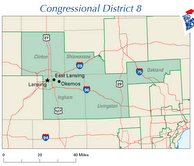OK, on to the actual post:
A few weeks ago, Congress did the responsible thing (finally), and rolled back the $14.5 billion worth of tax-break goodies for the oil and gas corporations. No big surprise that Mike Rogers voted against it, giving full-throated warnings that taking away the subsidies will hurt U.S. national security:
"If you care about our children, stop sending the money to (Iranian President Mahmoud) Ahmadinejad and (Venezuelan President Hugo) Chavez," Rogers said.
Well, Mahmoud and Hugo must be sharing the wealth because today's NYT noted that Exxon Mobil made record profits in 2006:
Exxon, the world’s largest publicly traded oil company, reported profit of $10.3 billion in the fourth quarter. That represented a decline of 4.3 percent from its record profit in the fourth quarter of 2005 and was Exxon’s first quarterly decline in almost three years.
But for the year, Exxon’s profit rose 9 percent from 2005 results to a record of $39.5 billion, the largest annual profit ever for an American company.
Oil prices for the quarter ranged between $55 and $63 a barrel, averaging just shy of $60. That represented a 15 percent decline from the third quarter and was less than 1 percent lower than the fourth quarter of 2005. Shell reported a profit $5.28 billion, a 21 percent rise from the fourth quarter of 2005. Shell’s annual income of $25.4 billion was also a record.
Production rose 4.1 percent to 3.65 million barrels of oil a day in the fourth quarter.
This gap between Rogers' grasp of global markets and economic reality was something my grandfather would have called "damnfoolery." A more elegant term might be cognitive dissonance. Wikipedia gives a pithy summary of this state, which on closer examination sounds an awful lot like the standard Republican response to policies they don't like:
This leads some people who feel dissonance to seek information that will reduce dissonance and avoid information that will increase dissonance. People who are involuntarily exposed to information that increases dissonance are likely to discount that information, either by ignoring it, misinterpreting it, or denying it.
Seems as though Mr. Rogers is in for some rather trying times.





No comments:
Post a Comment